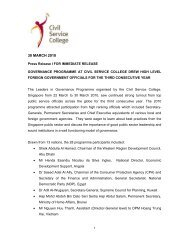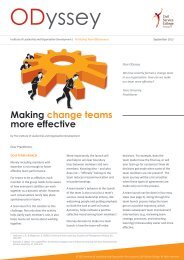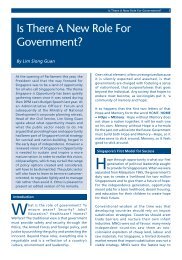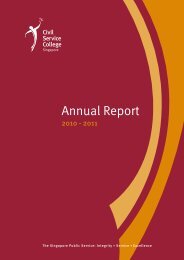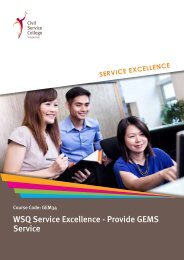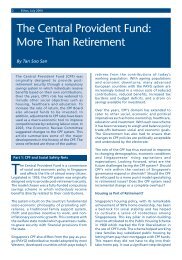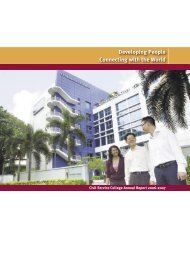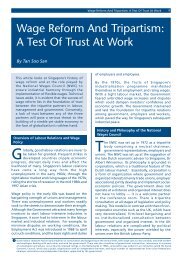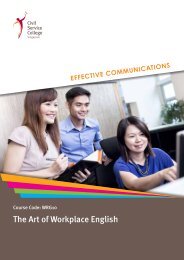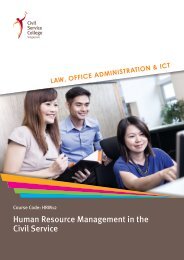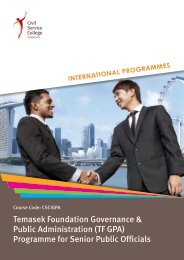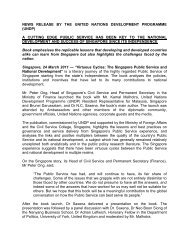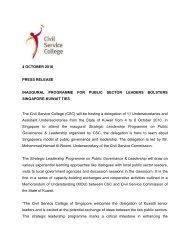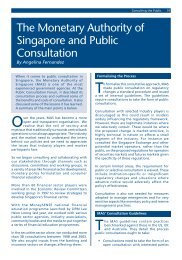Public Consultation Toolkit - Civil Service College
Public Consultation Toolkit - Civil Service College
Public Consultation Toolkit - Civil Service College
Create successful ePaper yourself
Turn your PDF publications into a flip-book with our unique Google optimized e-Paper software.
<strong>Public</strong> <strong>Consultation</strong> <strong>Toolkit</strong> 65 66 <strong>Public</strong> <strong>Consultation</strong> <strong>Toolkit</strong><br />
2. Exhibitions/road shows<br />
Exhibitions or roadshows allow agencies to utilise numerous<br />
formats to engage and share information with the public<br />
and obtain public feedback. During these events, agencies<br />
can provide a visual representation of the issues at hand<br />
(e.g. housing projects, nature parks). It also provides an<br />
opportunity for greater interaction between staff and the<br />
public.<br />
Agencies should determine the types of media available at<br />
the event, and prepare the necessary items such as flyers,<br />
information guide and presentations.<br />
The target audience for such exhibits/road shows are the<br />
general public.<br />
Before conducting exhibitions/road shows, agencies<br />
should determine:<br />
• Location – ensure that the location chosen for the event<br />
is easily accessible to the target audience. It should be<br />
conveniently located, welcoming and comfortable.<br />
• Atmosphere – an exhibition/road show provides agencies<br />
the opportunity to be creative in the way information is<br />
presented. Ensure that the variety of media planned for<br />
display is interesting without being overwhelming.<br />
• Content – information should be tailored to the target<br />
audience. If a sensitive topic is being addressed, ensure<br />
that personnel are well-equipped to handle potentially<br />
difficult members of the public.<br />
• Staff – ensure that officers selected for the event are well<br />
equipped with the knowledge and information to explain<br />
concepts and answer questions or gain feedback from the<br />
public. Officers should be trained to be polite, courteous<br />
and helpful. It would also be beneficial to have multilingual<br />
officers available to attend to members of the<br />
public who are non-English speakers.<br />
TIPS FOR<br />
EFFECTIVENESS<br />
• Ensure that the variety of<br />
media planned for display<br />
is interesting without<br />
being overwhelming.<br />
• If feedback is obtained<br />
from comment cards or<br />
short questionnaires,<br />
ensure that they are<br />
prominently displayed.<br />
Always supply writing<br />
materials.<br />
• Consider documenting the<br />
verbal feedback received<br />
at roadshows.<br />
When is it most useful?<br />
Exhibitions/road shows are most useful when a substantial amount of visual representations<br />
are required to adequately explain the subject (e.g. architectural concepts). They allow for the<br />
use of interactive technology, and provide a comfortable avenue for confrontational issues to<br />
be discussed. Exhibitions/road shows are also beneficial in reaching an audience that may not<br />
otherwise be involved in consultation. They allow members of the public who may not speak<br />
English to engage with the issues through staff who are trained in another language or dialect.<br />
Considerations<br />
Exhibitions/road shows can be very staff intensive, and a large amount of preparation is required<br />
to ensure that the event is smooth-running.



